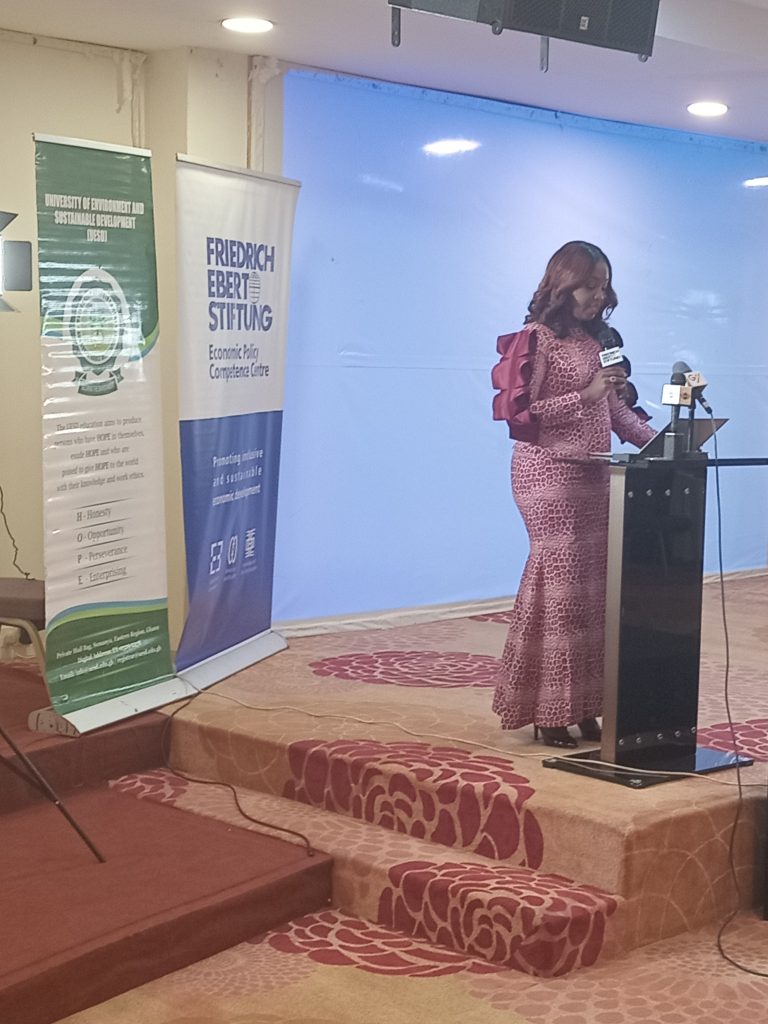By Maxwell Awumah
Ho, July 24, GNA – Dr. Abena Asomaning-Antwi, Managing Director, Africa Environmental Sanitation (AfES) Consult, Accra has called on Ghanaians to change attitudes to single-use
items with stakeholders finding lasting solutions to reduce and recycle waste products to stimulate circular economy transition (CET).
That will ensure green and decent job creation.
“Let us all do our part to Refuse single-use items, Reduce and Recycle waste, Reuse or Repurpose items, and allow organics to Rot,” she noted.
She said the linear economy model, which was produce-use-dispose had seen consumers waste-up to US$460 billion per annum, by discarding clothes they could still wear into landfills, but the CET would eliminate this waste and sustain incomes.
Dr Asomaning-Antwi made these statements in an address at the two-day Sustainable Development Stakeholder Conference in Ho on Circular Economy Transition.
The stakeholder engagement was jointly organised by the Friedrich Ebert Stiftung (FES) Economic Policy Competence Centre (EPCC), and the University of Environment and Sustainable Development (UESD).
The conference, themed, “Circular Economy Transition for Accelerated Green Jobs Opportunities: A Stakeholder Engagement aimed to create the space to bring together local and international professionals to discuss the implications of circular economy adoption and implementation as an enabler of green and decent job creation in Ghana.
Dr Asomaning-Antwi said the advocacy for a circular economy transition for accelerated green job opportunities, water access, municipal waste concerns and climate change mitigation was the way-forward as the linear model, tried over time has been diagnosed as unsustainable.
She said research and partnerships continued to be a pillar in fueling green initiatives as it allowed measurement of the current situation and predicted future possibilities.
She cited the Jospong Group of Companies as mainstreaming the concept of circular economy in its business model and providing job opportunities.
“It is thus one of the most diversified number of companies in Ghana with a focus on its mission of “improving lives” and it currently has 7,250 employees, 5,750 of whom are in the Environment and Sanitation sub-group, with Zoomlion Ghana Limited being the largest employer within this category. I am sure we can testify to the strides Zoomlion is making to minimise pollution in our country.”
Dr Asomaning-Antwi said better waste management could help increase flood resilience to prevent disasters such as the historic June 3 flood in Accra and recently in Ho and called on state actors, the private sector, academia, research institutions as well as the population to align to champion the CET to create more green and decent jobs for development.
Prof Eric Nyarko-Sampson, Vice-Chancellor of UESD said the initiative brought to the fore the importance of promoting circular economy transition agenda, aimed at creating value by retaining resources, regenerating natural systems, and eliminating waste and pollution.
He said the 2023 conference was focused on shifting the world’s attention from the linear economic approach to a circular economy, which emphasised resource efficiency, waste reduction and re-integration of materials into the economic system.
He disclosed that by 2050, waste generation in Sub-Saharan Africa was expected to rise more than triple from the current levels, while South Asia would more than double its waste stream.
Prof Nyarko-Sampson said Ghana generated about 12,710 tonnes of solid waste daily with only 10 per cent of it collected and disposed-off properly and plastic waste constituted a sizable proportion of urban waste, according to a UNDP report of October 2022.
He said all that threatened the foundations of human existence especially with devastating impact of climate change, loss of biodiversity and the depletion of finite resources.
“According to UNEP, by shifting the linear economy to a comprehensive circular economy approach, most plastic and other environmental pollution can be protected and the benefits accruing to a 25 per cent reduction in greenhouse gas emission across the global plastic life cycle.”
He said governments across the globe would save US$70 Billion over the period 2021-2040 and create 700,000 additional jobs in the global South.
The Vice-Chancellor disclosed that the Minister of Environment, Science, Technology and Innovation and other actors had developed a US$2.4 Billion CET roadmap and Action Plan over a 10-year period with investment and business opportunities in the plastic and electronics, agriculture and food, textiles, environment, water, and waste.
He said this was believed to create sustainable jobs for the youth and support economic resilience and national development, while thanking the FES-EPCC for their constant partnership.

Ms Eunice Asiedu, Programme Coordinator, EPCC, Friedrich Ebert Stiftung (FES) said out of its project, ‘Employment Generation in Africa,’- learning from good practices involving Rwanda, South Africa, Ethiopia, Madagascar, Benin, and Ghana to take stock of policies that created employment in Africa gave birth to the engagement.
She said the EPCC outfit perceived the Circular Economy as a potential option for employment creation, and therefore conscious effort be made to strengthen decent work pillars in the transitioning processes and re-skill and up-skill workers to ensure a just transition.
“There must be localisation of circular economy strategies and mainstreaming of gender in the process of transitioning.”
She is optimistic discussion would delve into the linkages between the transition of circular economy, social and environmental protection.
GNA